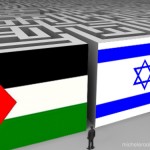Monday
Dec282009
The Anniversary of the Gaza War: Who "Won" after Operation Cast Lead?
 Monday, December 28, 2009 at 9:09
Monday, December 28, 2009 at 9:09  Israeli Defense Forces, commanded by the government of Ehud Olmert, started Operation Cast Lead on 27 December 2008. The operation took the lives of 1,400 Palestinians, including many civilians, and of 13 Israelis.
Israeli Defense Forces, commanded by the government of Ehud Olmert, started Operation Cast Lead on 27 December 2008. The operation took the lives of 1,400 Palestinians, including many civilians, and of 13 Israelis.The officially-stated aim was to halt rocket attacks from the Gaza Strip. “For the first time in years, the children of southern Israel can grow up without the constant fear of an incoming rocket and running to the nearest bomb shelter," Israeli government spokesman Mark Regev asserted on Sunday. So, the mission was “accomplished“ since there was no rockets coming over children in playgrounds.
Was it?
In a televised speech, the Hamas Prime Minister in Gaza, Ismail Haniyeh said, "Gaza was victorious. Yes, Gaza was victorious with its steadfastness, its firmness and strength of faith.”
Was it?
On Sunday, about 3,000 people milled around a square in the northern Gaza town of Jebaliya,according to The Jerusalem Post. "I wish they had commemorated the war by opening a factory. That would have been better than this," said Gaza resident Rami Mohammed, 30.
This line set out the reaction of Gazans that Hamas has contributed heavily to their impoverishment, through its uncompromising position both against the Palestinian Authority and against Israel. In that sense, neither Hamas nor Gaza has been victorious.
On the other hand, the new government of Israel has showed no progress in its supposed aim of ameliorating the deteriorating political, social, and economic situation in Gaza. Instead of searching for dialogue to contribute to the $4.5 billion international reconstruction project, Israel completely closed the border. Arguably, leaving people in a cage without sufficient medicine and food and with inadequate and unsanitary water supplies; cutting interaction with the outside world, is a worse crime than directly bombing civilians during Operation Cast Lead. At the end of the day, it is Israel under heavy criticism from around the world. Is that victory?
On Sunday, United Nations Secretary General Ban ki-Moon went beyond notions of victory. He said that was "deeply concerned that neither the issues that led to this conflict nor its worrying aftermath are being addressed", and he added that Gazans were being denied "basic human rights". Ban urged Israel to end its "unacceptable and counterproductive blockade".
Maybe a most significant reaction, however, is that of Khadija Omari, 45, whose brother Said Jaber, 32, was killed in the conflict:
The war made us aware of how much the Jews hate us. But we also hate the Jews even more. Now the children beg us to fight them, that's what the war taught us.
